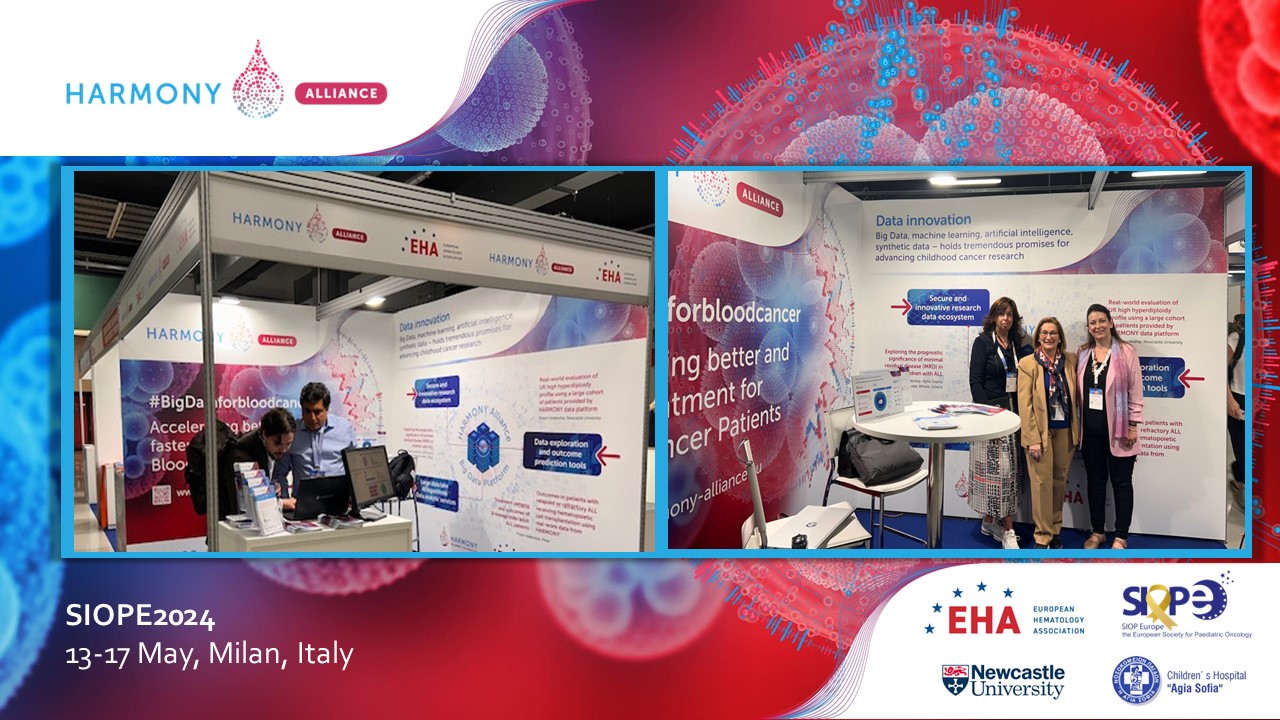We participated in the 5th SIOP Europe Annual Meeting in Milan, Italy on 13-17 May 2024. SIOP stands for European Society for Paediatric Oncology. The Annual Meeting was held in partnership with Childhood Cancer International (CCI) Europe.
Big Data, data analytics, machine learning and artificial intelligence hold tremendous promises for advancing childhood cancer research.
In recent decades, diagnosis and treatment of Hematologic Malignancies have substantially improved, but many remain incurable. The key outstanding questions in blood cancer research can only be answered by studying large numbers of patients.
Therefore, the HARMONY Alliance has developed a unique research infrastructure to facilitate Big Data research in the field of Hematologic Malignancies (HM). Young Pediatric HM patients, children with blood cancer, still have their lives ahead of them. HARMONY Alliance data-driven research projects will have a valuable impact on children, teenagers and young adults with cancer.
Through our booth at the SIOPE2024 exhibition, we connected with the pediatric hematology community and childhood cancer professionals to share more about the HARMONY ALL and Pediatric HM research projects. Find an overview below. More information was distributed by dedicated engagement materials such as:
Exploring the prognostic significance of minimal residual disease (MRD) in children with ALL
- Research challenge: Quantification of minimal residual disease (MRD) is a cornerstone of treatment response assessment and risk stratification in acute lymphoblastic leukemia (ALL), and the prognostic impact of MRD at different time points has been investigated across many therapeutic protocols. However, at present, there remains a lack of established prognostic biomarkers for risk stratification, especially in T-ALL, which reflect the underlying disease burden. Additionally, apart from absolute MRD values, the combined evaluation of MRD, and the analysis of log reduction rates between different time points, reflecting the different blast clearance kinetics and possibly different underlying biology, is still an issue that has not been addressed and fully evaluated. This study aims to determine whether the combination of MRD values, and evaluation of the leukemia burden decrease by log-reduction rates, may provide a new tool for predicting relapse and patient outcomes in both B-cell and T-cell ALL.
- Project leadership: Mirella Ampatzidou and Sophia Polychronopouloun, Aghia Sophia Children’s Hospital
Use of Big Data to improve outcomes for patients with Acute Lymphoblastic
- Research challenge: To generate sufficient data from patients with ALL within the HARMONY Big Data Platform to enable a thorough analysis of potential biomarkers associated with prognosis and their interaction with treatment outcomes. The initiation and progression of Acute Lymphoblastic Leukemia (ALL) is regulated by a wide spectrum of chromosomal and genetic abnormalities. Despite excellent prognosis in children and young adults with ALL, the situation in older adults (>25 years) is more challenging and there is a need to improve the risk stratification algorithms to optimize patient treatment and outcomes. published in Nature Leukemia.
- Project leadership: Anthony Moorman and Amir Enshaei, Newcastle University
Harnessing the Power of Big Data to Predict Outcomes Post-Stem Cell Transplant in ALL
- Research challenge: Stem cell transplant (SCT) is a key approach to treating acute lymphoblastic leukemia (ALL) but estimating and predicting survival and other outcomes post-SCT remains difficult, particularly for patients with relapsed/refractory (R/R) disease. Current datasets are sporadic and variable, tend to focus on de novo rather than R/R ALL and often contain clinical information that is decades old.
- Project leadership: Russell-Smith and Alexander Neuhof, Pfizer
Exploring treatment patterns and outcomes in B-ALL patients
- Research challenge: Older adults (>55 years) represent an important part of the overall B-precursor acute lymphoblastic leukemia (B-ALL) patient population, however, only limited data are currently available on prognosis and treatment outcomes. Because existing datasets are sporadic and variable, it can be difficult for physicians to make optimal clinical management decisions for their older B-ALL patients.
- Project leadership: Russell-Smith and Alexander Neuhof, Pfizer
The HARMONY Alliance would like to thank SIOP and CCI Europe for this opportunity.

Receive the latest news. Click here to subscribe!
